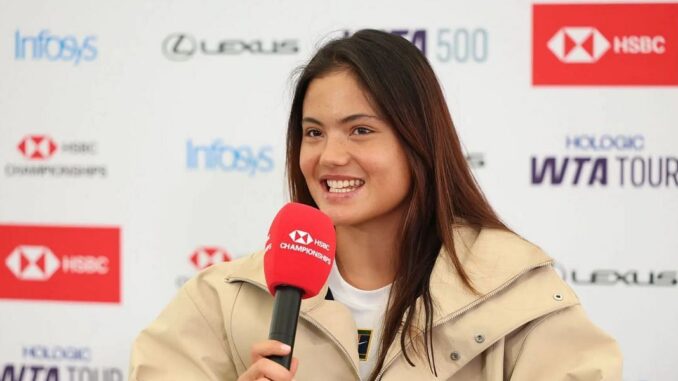
Emma Raducanu, Britain’s 2021 US Open champion, is embracing the whirlwind of the tennis season as she transitions from the red clay of Roland Garros to the lush grass courts of the WTA 500 Queen’s Club Championships, which kicked off on June 9, 2025. Fresh off a fourth-round appearance at the French Open, where she fell to eventual finalist Aryna Sabalenka, Raducanu candidly shared the challenges of switching surfaces in a matter of days. “It’s extreme and it’s different,” she said in a press conference at Queen’s, reflecting on the physical and mental demands of adapting from clay’s grinding rallies to grass’s lightning-fast exchanges. Her honesty about the “crazy” schedule and her excitement to play on home soil have captivated fans as she aims to build momentum for Wimbledon, starting June 30.
Raducanu’s French Open campaign was a testament to her resurgence. After battling wrist and ankle injuries since her 2021 breakthrough, the 22-year-old showcased her grit in Paris, defeating Ons Jabeur and Ekaterina Alexandrova before Sabalenka ended her run in a 6-4, 3-6, 6-3 battle. “I was really proud of my fight and my tennis,” Raducanu said, noting how her improved physicality allowed her to compete with the world No. 1. Her clay-court swing, including a quarterfinal in Madrid and a semifinal in Stuttgart, marked a career-best 12-5 record on the surface, a far cry from her struggles in 2022 and 2023. Yet, the abrupt shift to grass, where points are shorter and footing is precarious, poses a unique challenge. “You go from sliding around and having time to construct points to suddenly everything is so quick, and you have to be so sharp with your movement,” she explained, highlighting the need for precision and adaptability.
The Queen’s Club event, the first WTA 500 tournament at the historic venue since 1973, offered Raducanu a perfect stage to test her grass-court game. Paired with Katie Boulter in doubles, she secured a 6-4, 6-2 win over Wu Fang-hsien and Jiang Xinyu, delighting a raucous Court One crowd. “I was actually very nervous before the match, probably more nervous than for singles,” Raducanu admitted, crediting Boulter’s guidance for easing her into doubles. In singles, she opened with a 6-4, 7-5 victory over Cristina Bucșa, signing the camera lens with “home turf” and a smiley face, a nod to her comfort on British grass. Her next test, a second-round clash with Rebecca Sramkova, who upset 2022 Wimbledon champion Elena Rybakina, looms as a chance to climb closer to the top 30, with her current No. 37 ranking reflecting a steady rise.
Raducanu’s grass-court journey is deeply personal. Growing up watching Queen’s Club matches, she called playing there “an absolute dream.” Her best Wimbledon result, a fourth-round appearance in 2024, fuels her ambition to go deeper this year, especially as she competes for the British No. 1 spot against Boulter. “I’m not focused on rankings, just on playing my game and enjoying it,” she said, echoing Boulter’s focus on personal growth over their friendly rivalry. The compressed schedule—eight days between Roland Garros and Queen’s—adds pressure, with Raducanu noting, “It’s crazy how fast it all comes around.” She’s adopted a lighter approach, inspired by her doubles partnership with Boulter, where laughter and high-fives have replaced the intensity of clay. “I’m just trying to have fun and not put too much pressure on myself,” she added.
Fans and analysts see Raducanu’s grass-court potential, despite her 6-4 Wimbledon record. Her aggressive baseline game and improved serve, refined under coach Nick Cavaday, suit the surface’s low bounce and quick points. However, her history of injuries—wrist surgery in 2023 and recurring back spasms—requires careful management. “The body feels good, but grass is so different, you have to be cautious with movement,” she said, aware of the risk of slips. Her preparation includes the Nottingham Open after Queen’s, aiming for match sharpness before Wimbledon, where she’ll face a field led by Sabalenka, Gauff, and Rybakina.
Raducanu’s candor about the surface switch resonates with players like Carlos Alcaraz, who also faced fan backlash over the tight clay-to-grass turnaround. Her ability to adapt, as shown in her 2024 Wimbledon run, suggests she could challenge for a deep run. With the home crowd behind her and a renewed love for the game, Raducanu’s “extreme” transition is a compelling storyline as Wimbledon approaches.
Leave a Reply